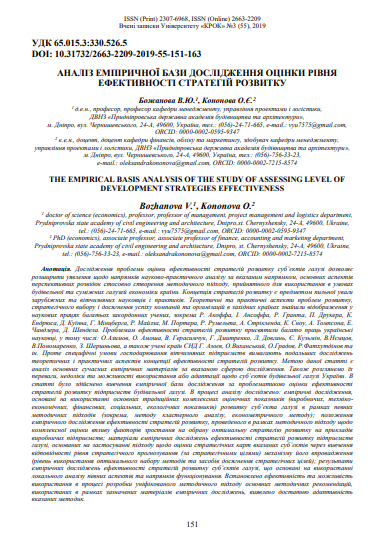THE EMPIRICAL BASIS ANALYSIS OF THE STUDY OF ASSESSING LEVEL OF DEVELOPMENT STRATEGIES EFFECTIVENESS
DOI:
https://doi.org/10.31732/2663-2209-2019-55-151-163Keywords:
evaluation, efficiency, methodology, strategic management, development strategy, construction industry, construction businessAbstract
The study of the problem of the effectiveness evaluating of subjects development strategies of the industry allows us to expand our understanding of the directions of scientific and practical analysis in this direction, the main aspects of prospective exploration for creating a methodological approach that is acceptable for use in the construction and related industries of the country's economy. The concept of development strategies is the subject of close attention by foreign and domestic scholars and practitioners. The theoretical and practical aspects of the development problems, strategic choice and success of companies and organizations in Western countries are reflected in the scientific works of many foreign scientists, in particular R. Akoff, I. Ansoffa, R. Grant, P. Drucker, K. Andrews, D. Quinn, G. Mintzberg, R. Miles, M. Porter, R. Rumelta, A. Strickland, K. Snow, A. Thompson, E. Chandler, D. Shendel. Many works have been devoted to the problems of the development strategies effectiveness by Ukrainian scientists, including: O. Alimov, O. Amosha, V. Gerasymchuk, G. Dmitrenko, L. Dovgan, E. Kuzmin, V. Nemtsov, V. Ponomarenko, Z. Shershnev, as well as scientists of the CIS countries G. Azoev, O. Vihansky, O. Gradov, R. Fatkhutdinov and others. However, the specific economic conditions of domestic enterprises require further research into the theoretical and practical aspects of the concept of the development strategies effectiveness. The purpose of this article is to analyze the main modern empirical materials in the specified field of research. Let us also consider their advantages, disadvantages and possibilities of using or adapting them to the subjects of the construction industry of Ukraine. The article examines the empirical base of the study on the problems of evaluating the development strategies effectiveness of enterprises in the construction industry. In the course of the analysis the following are investigated: empirical studies based on the use of the main traditional complex evaluation indicators (production, technical, economic, financial, social, environmental indicators) of the development of the industry the subject in the framework of certain methodological approaches (in particular, the method of cluster analysis, econometric method); the provision of an empirical study of the development strategies effectiveness conducted as part of a methodological approach to comprehensively evaluate the impact of growth factors on the chosen optimal development strategy based on the examples of manufacturing enterprises; empirical studies of the effectiveness of industry development strategies based on the application of an approach to evaluate the strategic maps of these entities by examining the relevance of the strategic forecasting (for strategic goals) mechanism of its implementation (the level of use of the optimal set of methods and means to achieve strategic goals); empirical research into the effectiveness of industry development strategies based on the use of local analysis of specific aspects and areas of operation. The efficiency and the possibility of using the basic methodological recommendations used in the framework of the mentioned empirical research materials in the process of developing a unified methodological approach are determined, and the adaptability of the mentioned methods is revealed.
Downloads
References
Біліченко В. В. Передумови обґрунтування стратегічного розвитку виробничих систем автомобільного транспорту в Україні. Вісник ЖДТУ. 2014. № 2(69). С. 33-42.
Дєдушева М. Застосування модифікованого методу Холта-Уінтера для прогнозування податкових надходжень в Україні. Світ фінансів. 2014. № 3. С. 126-134.
Каплан Р. С., Нортон Д.П. Стратегические карты. Трансформация нематериальных активов в материальные результаты: пер. с англ. Москва : ЗАО «Олимп-Бизнес», 2005. 512 с.
Крикун К. В., Оліферук С. Л., Рязанов А. С. Економічні фактори підвищення ефективності трудових ресурсів у будівництві. Бізнес-Інформ. 2014. № 10. С. 186-191.
Кустріч Л. О. Стратегічне управління ресурсним потенціалом аграрних підприємств: дис. … докт. екон. наук : 08.00.04. Херсон, 2018. 504 с.
Лісун Я. В., Дячук М. В. Стратегічний аналіз підприємств будівельної галузі. Інноваційна економіка. 2013. № 5(43). С. 79-83
Малярець Л. М., Штереверя А. В. Збалансована система показників в оцінці діяльності підприємства : навч. посібник. Харків : ХНЕУ, 2008. 185 с.
Міняйленко В. Г., Міняйленко І. В., Биба В. В. Проблеми та перспективи розвитку підприємств будівельної галузі. URL : http://www.economy.nayka.com.ua/pdf/7_2018/49.pdf.
Мороз О. В., Воловодюк С. С. Опис моделі галузевого впливу на стан ринку. Бізнес-Інформ. 2014. № 11. С. 134-141
Побігун С. А. Оцінка ефективності стратегічного управління нафтогазовими підприємствами на основі економетричних досліджень. URL : http://www.economy.nayka.com.ua/?op=1&z=3868.
Побігун С. А. Обґрунтування стратегічних рішень щодо сталого розвитку підприємств. Вісник Хмельницького національного університету. 2010. №3. С. 153-157.
Проданова Л. В., Панкова Л. І., Зайва Ю. О. Проблемні аспекти ринку будівельної галузі України. Економічний вісник Запорізької державної інженерної академії. 2016. Вип. 6-2(06). С. 57-61.


